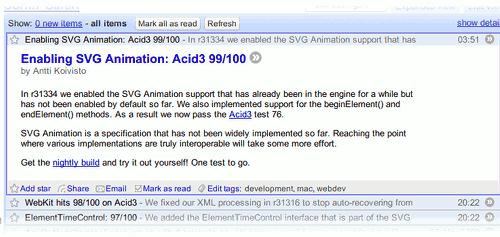HRDL 1.08 – OTE strikes again!
 Άλλη μια έκδοση του HRDL ώστε να λειτουργει με τις σημερινές σελίδες του ΟΤΕ, και συγκεκριμένα τις αλλαγές που έγιναν πρόσφατα και απέτρεπαν το widget από το να δείχνει σωστά διευθύνσεις.
Περισσότερα στο ChangeLog.
Άλλη μια έκδοση του HRDL ώστε να λειτουργει με τις σημερινές σελίδες του ΟΤΕ, και συγκεκριμένα τις αλλαγές που έγιναν πρόσφατα και απέτρεπαν το widget από το να δείχνει σωστά διευθύνσεις.
Περισσότερα στο ChangeLog.
 Άλλη μια έκδοση του HRDL ώστε να λειτουργει με τις σημερινές σελίδες του ΟΤΕ, και συγκεκριμένα τις αλλαγές που έγιναν πρόσφατα και απέτρεπαν το widget από το να δείχνει σωστά διευθύνσεις.
Περισσότερα στο ChangeLog.
Άλλη μια έκδοση του HRDL ώστε να λειτουργει με τις σημερινές σελίδες του ΟΤΕ, και συγκεκριμένα τις αλλαγές που έγιναν πρόσφατα και απέτρεπαν το widget από το να δείχνει σωστά διευθύνσεις.
Περισσότερα στο ChangeLog.
 These past few days there's been a flurry of WebKit posts over at Surfin' Safari about its ACID3 performance. I guess when dealing with bugs, and given the fact that Microsoft typically needs around 5 years before simple CSS1 bugs are fixed (as an aside the first and only version of Internet Explorer to date that passes ACID2 is 8 Beta 1, released a couple of weeks ago), I was surprised to see how fast the WebKit developers worked towards passing the ACID3 test. Between 20:22 and 03:51 another three ACID3 bugs were fixed, taking the score to 99/100. I guess by tomorrow WebKit will officially be ACID3 compliant. Woohoo!
By comparison, Firefox 3.0 Beta 4 that I'm using to write this post in Ubuntu Hardy Heron Beta1 scores a somewhat respectable 68/100, although I don't think they'll pass ACID3 before the final version is out.
These past few days there's been a flurry of WebKit posts over at Surfin' Safari about its ACID3 performance. I guess when dealing with bugs, and given the fact that Microsoft typically needs around 5 years before simple CSS1 bugs are fixed (as an aside the first and only version of Internet Explorer to date that passes ACID2 is 8 Beta 1, released a couple of weeks ago), I was surprised to see how fast the WebKit developers worked towards passing the ACID3 test. Between 20:22 and 03:51 another three ACID3 bugs were fixed, taking the score to 99/100. I guess by tomorrow WebKit will officially be ACID3 compliant. Woohoo!
By comparison, Firefox 3.0 Beta 4 that I'm using to write this post in Ubuntu Hardy Heron Beta1 scores a somewhat respectable 68/100, although I don't think they'll pass ACID3 before the final version is out. I’ve been interested in the OLPC project ever since it started in early 2005. For one it represents a great humanitarian effort that — in theory — promises to bridge the gap between the technologically advanced US and Europe and the under-developed or developing countries in Africa, Asia and Latin America. In late 2006 I […]